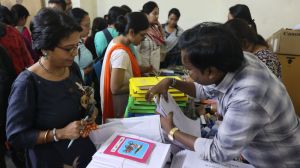India, Thailand sign Free Trade Agreement
India and Thailand on Thursday signed a landmark free trade agreement that would eliminate all tariffs on trade between the two countries by...

India and Thailand on Thursday signed a landmark free trade agreement that would eliminate all tariffs on trade between the two countries by 2010.
Prepared after six meetings of a Indo-Thai joint negotiating group, the framework agreement for establishing a bilateral free trade area provides for FTA in goods from year 2010, another FTA in services from 2006 and a third in investment also from 2006. The other accords include cooperation in the fields of agriculture, tourism and biotechnology.
The accords were signed by the External Affairs Minister Yashwant Sinha, Commerce Minister Arun Jaitley and Indian ambassador L. K. Ponappa from the Indian side.
Sinha said “India and Thailand are beginning a new partnership and a new era in our relationship. The meeting between the two prime ministers was a very comprehensive engagement. They voiced a sincere desire to move forward in promoting ties on all fronts.”
Regarding the ambitious India-Myanmar-Thailand trilateral highway project, Sinha said the ‘technical studies’ for the project was complete and foreign ministers of the three nations would meet in New Delhi at the end of the year to discuss the how to fund it.
With Thailand looking towards India as a future potential market, Prime Minister Vajpayee and Thai Prime Minister Thaksin Shinawatra decided on doubling trade exchange between the two countries by 2005 from the present $1 billion.
Asked why Thailand was wooing India, Sinha said “we are also wooing them.”
This has all got to do with India’s ‘Look East’ policy, he said, adding that there was a feeling among the ten-member Asean of which Thailand was a member that “India has started late but it has caught up’’.
At a banquet hosted in his honour by Thaksin, Prime Minister Atal Behari Vajpayee said the framework agreement on FTA should impart a fresh momentum to the economies and commercial ties between the two countries. “India-Thailand joint ventures have done remarkably well in this country, and are expanding. We need more of them in India,” Vajpayee said. He will address Thai businessmen and captains of Indian industry on Friday.
With India keen to establish its stature as an Asian giant and use multilateral forums in the continent to counter the west-dominated trading blocs, ties with eastern neighbours have assumed a new significance – and this understanding informs both the style and substance of Vajpayee’s first bilateral visit to Thailand.



- 01
- 02
- 03
- 04
- 05




























